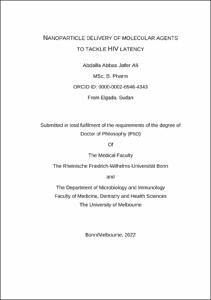Nanoparticle delivery of molecular agents to tackle HIV latency

Nanoparticle delivery of molecular agents to tackle HIV latency

| dc.contributor.advisor | Hartmann, Gunther | |
| dc.contributor.author | Ali, Abdalla Abbas Jafer | |
| dc.date.accessioned | 2022-09-16T08:06:50Z | |
| dc.date.available | 2022-09-16T08:06:50Z | |
| dc.date.issued | 16.09.2022 | |
| dc.identifier.uri | https://hdl.handle.net/20.500.11811/10257 | |
| dc.description.abstract | Antiretroviral therapy (ART) effectively suppresses HIV replication in people living with HIV (PLWH), but treatment is lifelong. The persistence of long-lived, latently infected resting CD4+T cells is a significant challenge in achieving a cure for HIV infection. During the early course of infection, HIV integrates into the genome of CD4+ T cells (provirus) and establishes a reservoir of latently infected cells. These latently infected cells contain a transcriptionally silent provirus that can evade ART and resist immune-mediated clearance. One strategy toward eliminating HIV latency is the activation of HIV viral production by latency reversal agents (LRAs) to induce virus-mediated cytolysis or clearance through immune recognition in the presence of ART (often called "shock and kill").
A range of pharmacological and immunological interventions have been investigated to eliminate latency and purge the HIV latent reservoir, including epigenetic modifiers such as the histone deacetylase inhibitor romidepsin, compounds that work through the NF-KB pathway such as agonists of retinoic acid-inducible gene I (RIG-I); and immunomodulatory drugs. However, the shock and kill strategy has demonstrated limited efficacy both in vitro and in clinical trials based on lack of specificity, toxicity issues, inability to directly target the CD4+ T cells and the failure to reduce reservoir size. One approach to overcome some of these limitations is using nano-engineered particle delivery systems to encapsulate and deliver LRAs to latently infected T cells, which possess several advantages over more traditional drug delivery methods and could potentially increase potency and reduce toxicity. We developed two different nanocarrier solutions to encapsulate two distinct LRAs; romidepsin (a hydrophobic small molecule) and 5'triphosphate double-stranded RNA (a nucleic acid RIG-I agonist). Firstly, we utilised the PMASH particle drug delivery system to encapsulate romidepsin (RMD-NPs) and investigated their potency to reactive HIV latency and cytotoxic effects compared to a romidepsin-free drug formulation in cell line models of HIV latency. We successfully delivered RMD-NPs to a latently infected T cell line and reversed HIV latency with enhanced potency and reduced toxicity. Secondly, we optimised a delivery carrier platform for a RIG-I agonist using ethylenediamine-modified bovine glycogen (BGEDA) nanoparticles. This RNA/glycogen complex was able to induce IFN-I in primary CD4+ T cells and reversed HIV latency in a cell line model of HIV latency. These data illustrate the potential use of nano-engineered particles in HIV purging strategies and show how nanoparticle drug delivery systems may enhance the future of HIV therapy. | en |
| dc.language.iso | eng | |
| dc.rights | In Copyright | |
| dc.rights.uri | http://rightsstatements.org/vocab/InC/1.0/ | |
| dc.subject | T cells | |
| dc.subject | HIV | |
| dc.subject | Innate immunity | |
| dc.subject | Nanomedicne | |
| dc.subject.ddc | 610 Medizin, Gesundheit | |
| dc.subject.ddc | 615 Pharmakologie, Therapeutik | |
| dc.subject.ddc | 540 Chemie | |
| dc.title | Nanoparticle delivery of molecular agents to tackle HIV latency | |
| dc.type | Dissertation oder Habilitation | |
| dc.publisher.name | Universitäts- und Landesbibliothek Bonn | |
| dc.publisher.location | Bonn | |
| dc.rights.accessRights | openAccess | |
| dc.identifier.urn | https://nbn-resolving.org/urn:nbn:de:hbz:5-68017 | |
| ulbbn.pubtype | Erstveröffentlichung | |
| ulbbnediss.affiliation.name | Rheinische Friedrich-Wilhelms-Universität Bonn | |
| ulbbnediss.affiliation.location | Bonn | |
| ulbbnediss.affiliation.otherLocation1 | Melbourne | |
| ulbbnediss.affiliation.otherName1 | University of Melbourne | |
| ulbbnediss.thesis.level | Dissertation | |
| ulbbnediss.dissID | 6801 | |
| ulbbnediss.date.accepted | 10.08.2022 | |
| ulbbnediss.institute | Medizinische Fakultät / Institute : Institut für Klinische Chemie und Klinische Pharmakologie | |
| ulbbnediss.fakultaet | Medizinische Fakultät | |
| dc.contributor.coReferee | Lewin, Sharon | |
| ulbbnediss.contributor.orcid | https://orcid.org/0000-0002-6946-4343 | |
| ulbbnediss.contributor.gnd | 1274988837 |
Dateien zu dieser Ressource
Das Dokument erscheint in:
-
E-Dissertationen (1596)




